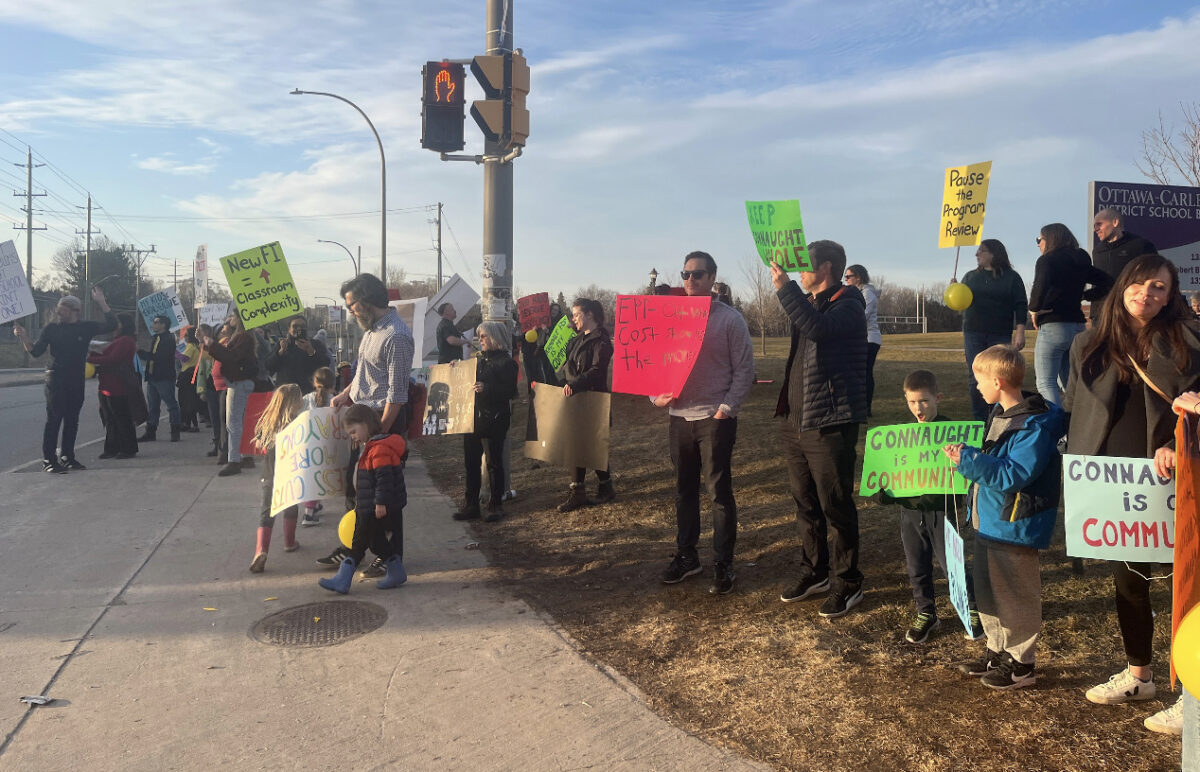The Ottawa-Carleton District School Board wants to eliminate the city’s five alternative schools, and some members of the public — particularly parents of the children who attend the schools — are not happy.
The board has undertaken an Elementary Program Review to determine whether its current model of delivering education serves the community most effectively. A number of planned changes — including the elimination of the alternative schools — would come into effect in September 2026.
Other proposals include school boundary changes and the addition of French Immersion instruction to all schools. The planned closing of alternative schools has sparked a groundswell of opposition.
Students, parents and advocates have written letters to the board to share their experiences with alternative schools and to urge trustees to reconsider.
Emily Addison, a parent and co-chair of the Alternative School Advisory Committee, has been among those speaking out. Her child attends Churchill Alternative School in Westboro.

On March 19, Addison addressed a special board meeting at the OCDSB’s board office on Greenbank Road, where many parents had gathered outside to protest various reform proposals.
In her comments to trustees and OCDSB staff, Addison told the board their planned changes could be serious mistakes.
She condemned the “phasing out of an incredibly innovative and valuable program that has even greater potential — the alternative schools.”
Addison told Capital Current the announcement of the proposed cuts was “very disappointing.”
Alternative schools offer more hands-on and self-directed learning experiences, collaborative opportunities and do not send home report cards, unless requested by a child’s guardian.
When Addison was introduced to alternative schools more than 10 years ago, she said she was “blown away” by what she saw. She added that the program has benefited her child, and others, in many ways.
“This program has drastically altered our child’s mental health for the better,” Addison said, adding that the alternative model has “drastically changed students’ thoughts about schooling and learning for the better.”
One aspect of Churchill’s alternative program that stands out to Addison is their “tree family” system. Students from Kindergarten to Grade 6 are placed into groups where they will remain for the duration of their time at the school. The purpose is to foster stronger relationships among all students.
“It creates a really strong sense of belonging and community in the school,” Addison said.
Max, a fifth grade student at Churchill, and his father, Adam Barnett, have been actively calling on the board to reverse the proposed cuts to alternative schools, citing the benefits the program has brought Max.
“It’s just more inclusive, and everybody feels equal there,” Max said. “And I get in trouble a lot less.”
In the fall of 2023, Barnett moved Max from the board’s regular stream to the alternative program. Barnett said he immediately noticed a positive difference.
“In the regular school, every two or three days, I would be hearing from the vice-principal,” Barnett said. He added that over the past 18 months that Max has been at Churchill, he has heard from the principal only once about behavioural issues.
“He’s the same person he was before,” said Barnett. “It’s the system that’s different.”
Barnett said he doesn’t think the board realizes the value of alternative schools and argues the cuts will create more issues.
Addison said the point of the advisory committee is to share the concerns of parents and students with the board and for trustees and other board officials to listen to their recommendations.
She acknowledged the work the board is doing is not easy, but wonders if it has enough staff to manage the review properly.
Ottawa is among the many Canadian cities experiencing teacher shortages, which sharply ramped up following the pandemic. Teacher retirements and student enrolment are both on the rise, as well as teacher burnout.
Educators have also been asking for public support in an attempt to prevent the cuts to the program.
One teacher at an alternative school in Ottawa, who asked to remain anonymous because of fear of possible repercussions at work, said alternative schools offer families another option when choosing their child’s education.
“Ask any current or former family about their experience within the alternative program and you are likely to hear about the safe and unique experience their family has had.”
She said the sense of community, diversity and inclusion that alternative schools provide are what helps create a “special experience” for students.
“In actual fact, they already represent many of the ideals and goals that the OCDSB wishes to achieve.”
While Addison said she hopes the board heard their pleas at the Wednesday night meeting, she and ASAC intend to continue discussions with trustees.
“They have a really hard job right now, and they’re getting a lot of angry parents talking to them,” Addison said.
Despite the anger and worry Barnett and Max feel about the possibility of alternative schools being shut down, they said they will continue to speak up and are not losing hope anytime soon.
“I just really want to make a difference,” Max said. “And we can do it!”
Board trustees will vote on the proposed changes in April.





Great article! Just a quick point of clarification. The Alternative program does not have smaller classes. It runs on the same class size and staffing model as the rest of the OCDSB elementary programs. This has been confirmed with OCDSB senior staff. The idea that the program has smaller classes is a semi-common mistaken idea. Instead, the difference is in HOW education is ‘delivered’ … the approach to teaching and learning. Email asac@ocdsb.ca if you’d like to follow up. Thanks. Emily Addison – OCDSB Alternative Schools Advisory Committee Co-Chair.
Hey Emily thanks for writing. I must admit I’ve been looking at our story and I don’t see any mention of class sizes. Perhaps you could indicate where that is.